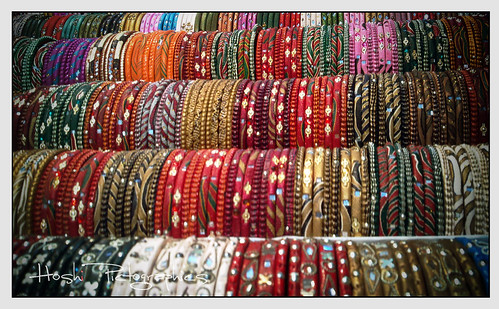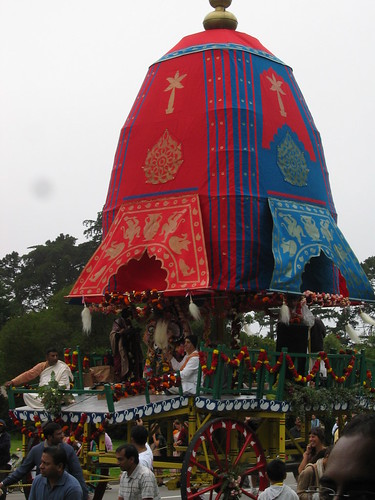Happy Diwali!
To celebrate this festival of lights, we’re celebrating English words that owe their roots to Hindi and other Indian languages. There are over 2,000 of them in Hobson-Jobson, “a historical dictionary of Anglo-Indian words and terms from Indian languages.” We’ve rounded up 12 of our favorites here, 11 from Hindi and one from Bengali. Enjoy!
bangle
“So he took the bangle and repairing to a goldsmith, said to him, ‘Break up this bracelet and sell it;’ but he said, ‘The king seeketh a perfect bracelet: I will go to him and bring thee its price.’”
Richard Burton, Arabian Nights, 1886
The word bangle originated around 1787, says the Online Etymology Dictionary, and comes from the Hindi word bangri, “colored glass bracelet or anklet.”
cummerbund
“Fellows are discarding waistcoats and wearing what they call a cummerbund—silk sash round the waist. I think I must follow the fashion.”
George Gissing, The Paying Guest, 1895
A cummerbund is “a broad sash, especially one that is pleated lengthwise and worn as an article of formal dress, as with a dinner jacket.” The word originated in the 1610s and comes from the Hindi kamarband, “loin band.”
cushy
“For decades a palace of well-paid vice presidents in cushy offices presided over the manufacture of Budweiser, America’s beer, in that most American of cities, St. Louis.”
Patrick Cooke, “This Bud’s For Sale,” The Wall Street Journal, November 4, 2012
While the word cushy, “making few demands; comfortable,” may seem like an alteration of the word cushion, it actually comes from the Hindi khush, “pleasant, healthy, happy.” Cushion comes from the Middle English cushin, which ultimately comes from the Latin coxa, “hip.”
[Photo: CC BY 2.0 by graymalk]
juggernaut
“Likewise, had Apple opened its iTunes-iPod juggernaut to outside developers, the company would have risked turning its uniquely integrated service into a hodgepodge of independent applications — kind of like the rest of the Internet, come to think of it.”
Leander Kahney, “How Apple Got Everything Right By Doing Everything Wrong,” Wired, March 18, 2008
A juggernaut is “an overwhelming, advancing force that crushes or seems to crush everything in its path,” and “something, such as a belief or institution, that elicits blind and destructive devotion or to which people are ruthlessly sacrificed.”
These figurative senses originated in the 1850s while the original sense, “huge wagon bearing an image of the god Krishna,” is from the 1630s, and is an alteration of Jagannatha, “a name given to Krishna, the eighth incarnation of Vishnu,” literally, “lord of the world.”
Jagannatha is also “a celebrated idol of this deity at Puri in Orissa,” at which “great multitudes of pilgrims come from all quarters of India to pay their devotions.” According to Century Dictionary,
On these occasions the idol is mounted on an enormous car—the car of Juggernaut—resting on massive wooden wheels, and drawn by the pilgrims. Formerly many of the people threw themselves under the wheels to be crushed to death, the victims believing that by this fate they would secure immediate conveyance to heaven. The practice is now of very rare occurrence.
Juggernaut is also the name of a character in Marvel Comics. The Juggernaut’s powers include superhuman strength, “extreme durability,” and being “physically unstoppable once in motion.”
loot
“She was no longer the same Moran of that first fight on board the schooner, when the beach-combers had plundered her of her ‘loot.’”
Frank Norris, Moran of the Lady Letty, 1898
Loot refers to “booty; plunder, especially such as is taken in war,” as well as “goods illicitly obtained, as by bribery”; “things of value, such as gifts, received on one occasion”; and “money.” According to the Oxford English Dictionary, loot comes from the Hindi lūt, which according to some scholars, comes from Sanskrit lōtra, lōptra, “booty, spoil.”
monkey business
“Those inventors and pioneers who came out of New England and made this country from a hunting-ground into an empire – they didn’t have all this monkey-business in technical schools and trade schools.”
William Hard, The Women of Tomorrow, 1910
Monkey business, which is sometimes hyphenated, is “silly, mischievous, or deceitful acts or behavior.” According to the OED, the phrase is attested to 1835 and probably comes from the Bengali bãdrāmi.
According to a comment on Language Hat, bandrami “connotes different shades of mischievousness that are not conveyed by monkey business,” such as children climbing trees to dangerous heights, adults not acting their age, and men trying “to draw the attention of a female with unbecoming gestures.”
punch
“You know from Eastern India came
The skill of making punch as did the name.
And as the name consists of letters five,
By five ingredients is it kept alive.”
Alice Morse Earle, Customs and Fashions in Old New England, 1894
This sense of punch meaning “a drink commonly made with wine or spirits, and either water or some substitute, as a decoction of tea, and flavored with lemon-juice or lemon-peel and sugar,” is believed to have come from the Hindi panch, meaning “five,” referring to “the number of original ingredients (spirits, water, lemon juice, sugar, spice).”
pundit
“Like Walter Lippmann, Alsop saw himself as a kind of pundit grandee, entitled to advise the public figures he wrote about.”
Evan Thomas, “The Real Cover-Up,” Newsweek, November 21, 1993
Nowadays a pundit is known as “a source of opinion; a critic,” but it also refers to “a learned person,” and specifically, “a learned Brahman: one versed in the Sanskrit language, and in the science, laws, and religion of India.” These latter senses originated in the 1670s, while the “source of opinion” sense is newer, attesting to 1816. The word comes from the Hindi paṇḍit, “learned man.” See also punditocracy.
seersucker
“Cissy put on the blue and white seersucker dress with the sailor collar and the red kerchief that she’d chosen, with Mummy, at David Jones department store in Sydney.”
Claire Messud, “Land Divers,” The New York Review of Books, July 16, 2009
Seersucker is “a light thin fabric, generally cotton or rayon, with a crinkled surface and a usually striped pattern.” Attested to 1722, the word comes from the Hindi sirsakar, a corruption of the Persian shir o shakkar, “striped cloth,” literally “milk and sugar,” referring to “the alternately smooth and puckered surfaces of the stripes.”
shampoo
“Just how this unusual shampoo works these miracles is a new scientific secret. It isn’t oil, it isn’t soap – it isn’t anything you’ve heard of before.”
“New-Type Shampoo Amazes Women Everywhere,” The Milwaukee Sentinel, October 18, 1936
The original meaning of shampoo was “to massage,” especially “in connection with a hot bath, for the purpose of restoring tone and vigor to the system.” This sense is attested to 1762 and comes from the Hindi champo, the imperative of champna, “to press, knead the muscles.” It came to mean “the act or operation of shampooing,” says the OED, around 1838; “to subject (the scalp) to washing and rubbing with some cleansing agent” around 1860; and the cleansing agent itself in 1866.
thug
“If a bearded thug who attacked two women is lurking in the dark shafts of an old Overbrook mine, chances are that he will never roam again.”
“Thug Faces Death If He’s in Mine,” The Pittsburgh Press, April 17, 1952
A thug, commonly known as “a cutthroat; a ruffian; a rough,” originally referred to “a member of a confraternity of professional assassins and robbers formerly infesting India, chiefly in the central and northern provinces.” The word comes from the Hindi ṭhag, which may come from the Sanskrit sthagaḥ, a cheat. See also Thuggee and thugocracy.
toddy
“A small china punch-bowl was then produced by the host, and was twice replenished with the very popular beverage called toddy, of which the Prince expressed his unqualified approbation.”
Mrs. Thomson, Memoirs of the Jacobites of 1715 and 1745, 1845
Toddy refers to “the drawn sap of several species of palm, especially when fermented,” and “a drink made of spirits and hot water sweetened.” The word comes from the Hindi tāṛī, “sap of palm.”
For even more English words derived from Indian languages, check out this list, and for more on Hobson-Jobson, see this article from BBC News Magazine.

